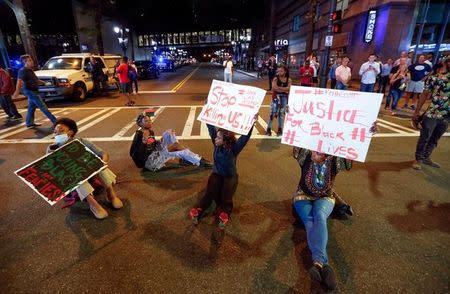As Charlotte riots, critics fear law will conceal more police video

By Daniel Trotta (Reuters) - Officials are keeping video of a fatal police shooting of a black man from the public in Charlotte, North Carolina, part of what open records advocates consider a disturbing trend nationally about police transparency. Amid street riots over Tuesday's shooting death of Keith Scott, 43, Charlotte police are promising an aboveboard investigation, but Police Chief Kerr Putney said the police body camera video will not be made available at this time, except to show it to Scott's family. Under current law, the Charlotte police have the discretion to release the video. However a state law coming into effect on Oct. 1 will set new restrictions, establishing that such videos are not public record and requiring a court order be released. Critics say that as more police departments across the country adopt body cameras, more laws are being implemented that make it increasingly difficult for the public to see the video they shoot. A lawyer for the Reporters Committee for Freedom of the Press says the trend is "incredibly disturbing" because the proliferation of police body cameras was meant to improve transparency in the wake of public outcry across the country when police have used deadly force against black men. "Pretty much every state to adopt legislation so far has done so in a manner that further limits public access to body cam videos. If nobody gets to see the video except for the police, then it's not doing the public a whole lot of good," said Adam Marshall, staff attorney for the committee. Eighteen states plus Washington, D.C., have laws governing the public access to police body camera video, according to the National Conference of State Legislatures (NCSL). Five of those states treat body camera recordings as public record, but they also provide many caveats allowing police to withhold, redact or obscure certain videos, the NCSL says. The North Carolina law will establish that police recordings are not public record. Police can show the video to people or their relatives, but the news media or the general public must request a court order to obtain the footage. Police groups defend such laws, saying they protect ongoing investigations and the privacy of those who appear in the videos, while also providing recourse for those who want to make the videos public. Backers of the new North Carolina law say it actually increases transparency, in part because police previously could keep video confidential by saying it was part of an officer's personnel file. Research suggests the cameras are helpful. In a 12-month experiment that the University of Cambridge conducted in 2012 with police in Rialto, California, use of force by officers wearing cameras fell 59 percent and reports against officers dropped 87 percent from the previous year. Taser, the leading manufacturer of police body cameras, said sales skyrocketed after the Rialto study was published. Taser says 3,500 police agencies in the United States have purchased its Axon cameras as of March 2016. The American Civil Liberties Union (ACLU) has called on Charlotte police to release the video and has opposed North Carolina's House Bill 972, which Governor Pat McCrory signed into law in July, saying it places a burden in terms of time and attorneys' fees on those who want to see police video. "This law has really taken a step backward," said Mike Meno, spokesman for the ACLU in North Carolina. The North Carolina Sheriffs' Association supports the law, saying it "strikes a perfect balance" between the rights of people depicted and the needs of law enforcement not to jeopardize investigations. Eddie Caldwell, executive vice-president and general counsel of the sheriffs' association, cautioned against putting too much faith in any one video, which was unlikely to capture all the crucial evidence. "You can't just take one little piece of evidence out of the whole picture and think you have the whole story," he said. (Reporting by Daniel Trotta; Editing by Alan Crosby)

